So you want a list of keywords that will help your managed service provider business get found in the search engines for highly lucrative monthly recurring revenue type customers?
Look no further – I’ve been working in the search engine optimization space for 17 years now. I’ve broken the keywords down into two sections.
First, we have the classical MSP keywords optimized for local searches. The second is niche-specific MSP keywords that have much less competition to appear in the search engine results but do have lower search volume.
Finally, I will lay out the keyword research tools and process involved in finding some magical MSP keywords you can use to find your business in the search engines without investing in Google ads.
Classical Local Specific MSP Keywords
IT Rockstars run a directory of IT companies to which our members can list their business. When new members join us, we ask what keywords they want to be found for. After running this directory for five years, we have enough data to report on the most common search terms in the managed services industry. This combines what most MSPs appear on the search engines’ first page and what potential customers state are the most common terms they’ve used to find our members on MSP Near Me.
The Top 65 MSP Marketing Keywords
| IT Support | Cyber Security | Disaster Recovery/Backup | Network | Cloud & Server |
| IT Support | network security | Cloud backup | Structured cabling installation | Microsoft 365 migration services |
| IT Services | secure email | Onsite backup | CAT6 installation | move server to the cloud |
| Outsourced IT | email phishing | RAID Recovery | Fix network socket | server support |
| IT helpdesk services | firewall solutions | Server power failure | Network switch installation | slow server |
| Remote IT Support | ransomware protection | Office flooding | Meraki/Product X local support | server crashing |
| Onsite IT support | ransomware removal | Water leakage on server | Increase wifi speeds | outlook support |
| IT consultancy | antivirus for business | server backup solution | Public wifi solutions | outlook help |
| IT consultant | virus protection | desktop backup solution | Facebook wifi login system | server software support |
| business IT providers | cyber security training | Microsoft 365 backup | Business internet support | exchange to cloud help |
| IT solutions | secure server software | data replication | Network router support | local azure services |
| desktop IT support | data encryption services | fix tape backup | Business internet installation | azure support |
| IT management | penetration testing | sharepoint backup | Local internet provider + | azure experts |
| IT managment | IT Company | Microsoft teams backup | Multisite internet solutions | azure cost reduction services |
Most of these search terms are focused on local SEO and local search engine optimization. You’ll need to include the location your business operates in. I suggest you pick three search terms from this list to rank highly in the search. Optimizing your homepage for the primary term such as “IT Support + City” or “IT Services + City”.
Your services page(s) should be optimized for secondary terms such as “Cyber security + City” or “Microsoft 365 Support + City”.
Tertiary MSP keywords or supporting topics related to your secondary terms should be found within your blog and link to your services page(s).
This primary, secondary, and tertiary structure will help you gain topical authority and allow your MSP website to have highly relevant long tail keywords that will result in ranking higher.

I’d strongly recommend avoiding keywords that include “managed services” or MSP. This is because these MSP keywords are only known within the industry. Very few of your potential customers know the term MSP and will be searching for it. True story: I didn’t know we were an MSP when I worked in an MSP!
Niche Specific Modern MSP Keywords
Modern MSPs and those that are more innovative know that the riches are in the niches. Local SEO is highly competitive, and depending on where you operate, some of the bigger MSPs have large budgets for dominating Google Maps, Google ads and organic search results.
That’s where the power of niche-specific keyword SEO strategy comes in. There are a growing group of modern managed service providers that are location-independent. They partner with local MSPs for 1st line “boots on the ground support” and specialise their managed service provider business for a specific industry. This allows them to optimize their MSP website nationally for niche-specific terms related to the industry and line of business applications commonly used within the niche.
Monthly search volume is, of course, much lower for niche-specific MSP keywords in the search engines. Still, there is much less competition, and you will have a greater chance of attracting more relevant traffic for search queries in the niche than local SEO terms.
The Top 100 Industry-Specific Keywords for MSPs
| Industry | Keywords |
|---|---|
| Healthcare | 1. HIPAA compliant IT services |
| 2. Healthcare data security solutions | |
| 3. Medical practice IT support | |
| 4. Telemedicine technology solutions | |
| 5. Electronic health records (EHR) management | |
| Finance and Banking | 1. Financial data security services |
| 2. Banking IT compliance solutions | |
| 3. Fintech IT support | |
| 4. High-frequency trading IT infrastructure | |
| 5. Financial data analytics solutions | |
| Legal Services | 1. Law firm IT support |
| 2. Legal document management systems | |
| 3. Cybersecurity for legal firms | |
| 4. Case management software support | |
| 5. Legal compliance IT solutions | |
| Manufacturing | 1. Manufacturing ERP solutions |
| 2. Industrial IoT management | |
| 3. Supply chain IT solutions | |
| 4. Manufacturing data analytics | |
| 5. Production line automation support | |
| Retail | 1. E-commerce platform IT support |
| 2. Retail POS system solutions | |
| 3. Customer data security for retail | |
| 4. Inventory management software support | |
| 5. Omnichannel retail IT solutions | |
| Education | 1. Educational technology support |
| 2. Campus network solutions | |
| 3. Student information system management | |
| 4. Online learning platform IT support | |
| 5. Cybersecurity for educational institutions | |
| Real Estate | 1. Real estate CRM software support |
| 2. Property management IT solutions | |
| 3. Virtual tour technology support | |
| 4. Real estate data analytics | |
| 5. IT support for real estate agencies | |
| Government and Public | 1. Public sector IT compliance |
| Sector | 2. Government data security solutions |
| 3. E-Government infrastructure support | |
| 4. Public records management systems | |
| 5. IT for public service delivery | |
| Technology and Startups | 1. Startup IT infrastructure setup |
| 2. Cloud services for tech companies | |
| 3. SaaS platform support | |
| 4. Tech startup cybersecurity | |
| 5. IT scaling solutions for startups | |
| Non-Profit Organizations | 1. Non-profit IT support services |
| 2. Donor management system IT support | |
| 3. Cost-effective IT solutions for non-profits | |
| 4. Non-profit data security | |
| 5. Volunteer management software support | |
| Construction and | 1. Construction project management software |
| Engineering | 2. CAD software IT support |
| 3. Engineering data management | |
| 4. Construction site connectivity solutions | |
| 5. BIM software support | |
| Hospitality and Travel | 1. Hotel IT support services |
| 2. Travel booking system support | |
| 3. Hospitality industry cybersecurity | |
| 4. Guest Wi-Fi solutions | |
| 5. CRM for hospitality industry | |
| Transportation and | 1. Logistics IT solutions |
| Logistics | 2. Fleet management software support |
| 3. Supply chain tracking solutions | |
| 4. Transportation cybersecurity | |
| 5. Warehouse management systems | |
| Automotive | 1. Automotive dealership IT support |
| 2. Vehicle telematics solutions | |
| 3. Auto manufacturing IT solutions | |
| 4. Automotive supply chain management | |
| 5. Car rental IT systems support | |
| Energy and Utilities | 1. Energy sector IT compliance |
| 2. Utility billing software support | |
| 3. Renewable energy IT solutions | |
| 4. Smart grid technology support | |
| 5. Oil and gas industry IT services | |
| Telecommunications | 1. Telecom network management |
| 2. VoIP solutions for telecoms | |
| 3. Data center services for telecom | |
| 4. 5G technology support | |
| 5. Telecommunications cybersecurity | |
| Professional Services | 1. IT for accounting firms |
| 2. Marketing agency IT solutions | |
| 3. Consulting firm technology support | |
| 4. CRM for professional services | |
| 5. Data security for consultants | |
| Agriculture and | 1. Agribusiness IT solutions |
| Agribusiness | 2. Farm management software support |
| 3. Agricultural data analytics | |
| 4. Precision farming technology | |
| 5. Supply chain solutions for agriculture | |
| Entertainment and Media | 1. Media production IT support |
| 2. Digital asset management for entertainment | |
| 3. Broadcasting technology solutions | |
| 4. Media streaming infrastructure | |
| 5. Entertainment industry cybersecurity | |
| Pharmaceuticals and | 1. Pharma IT compliance solutions |
| Life Sciences | 2. Laboratory information systems support |
| 3. Clinical trial data management | |
| 4. Biotech IT solutions | |
| 5. Pharmaceutical supply chain IT support |
How you prioritize and structure your MSP website for these terms differs from the local search mentioned above. That’s down to an interesting observation you can make for yourself. When you type these industry-specific keywords in the search results, it usually gives you a list of inner pages or blog posts. Very rarely does an MSP business homepage appear on the first page.
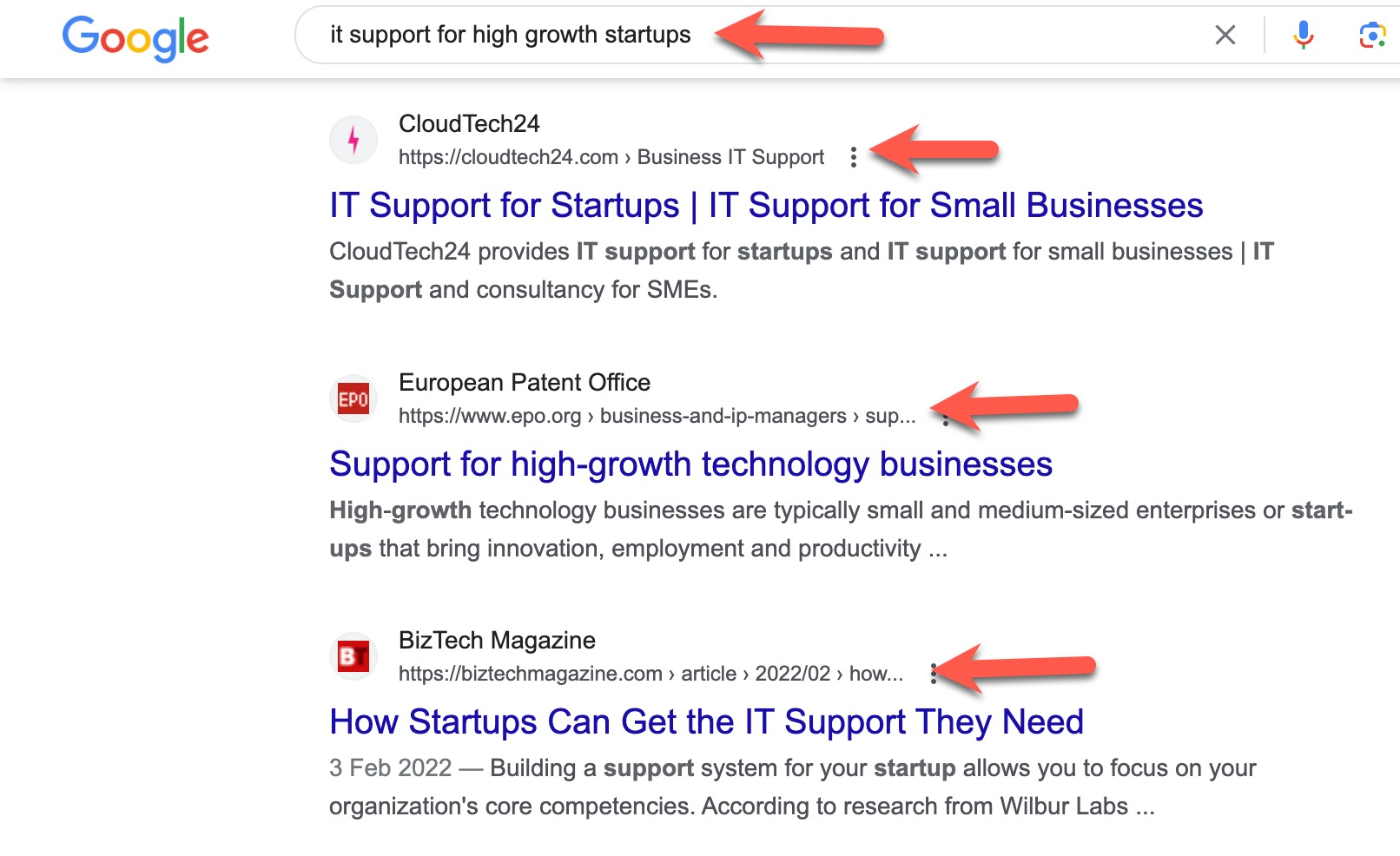
Above – blog articles & inner pages rank for niche-specific keywords – never the homepage.
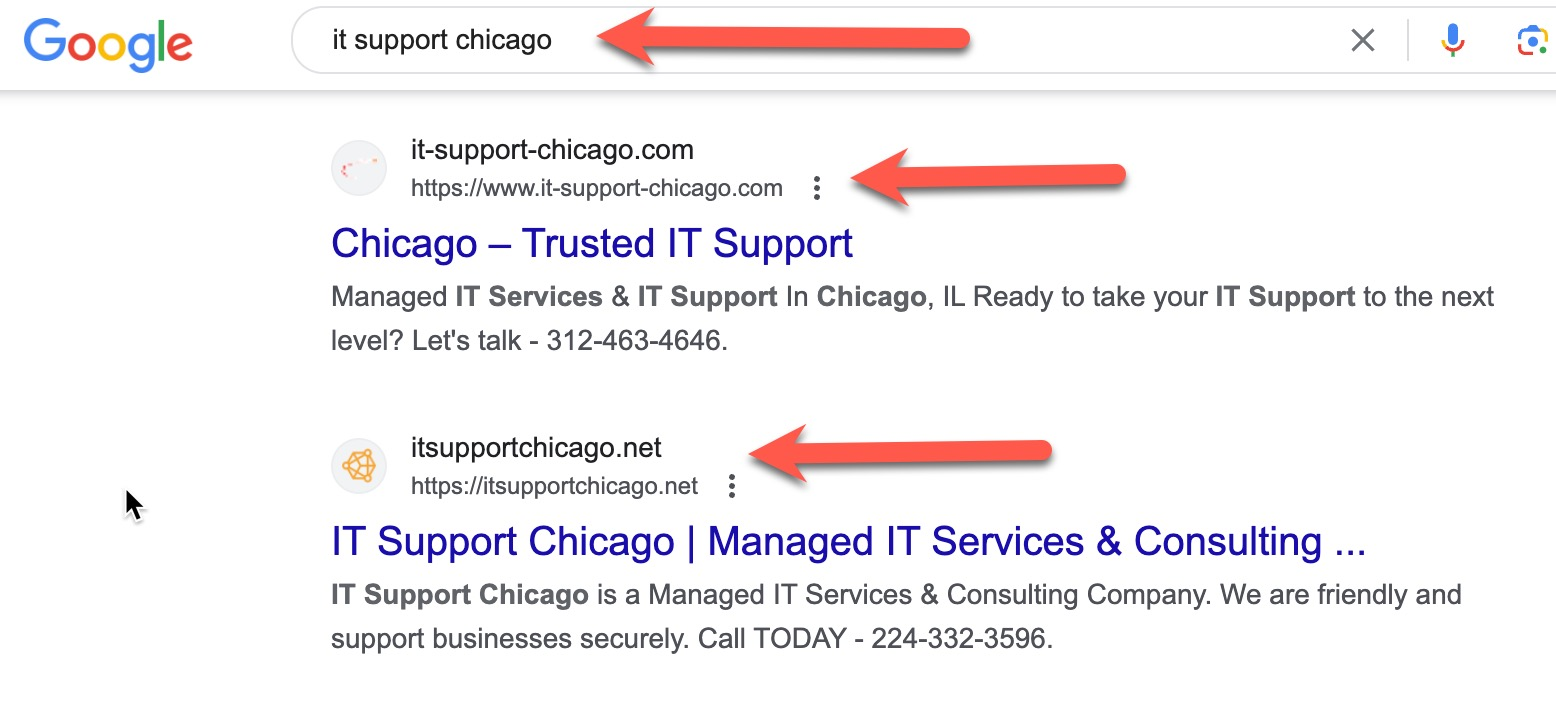
Above – Commercial intent-based keywords, homepages tend to rank on the 1st page.
Niche keywords search results return more informative research-based results than commercial intent-based search results. You will fail if you try to rank your homepage for these terms. Instead, focus on a blog post or service page optimized for niche-specific keywords and support with several blog posts that link to the optimized niche page.
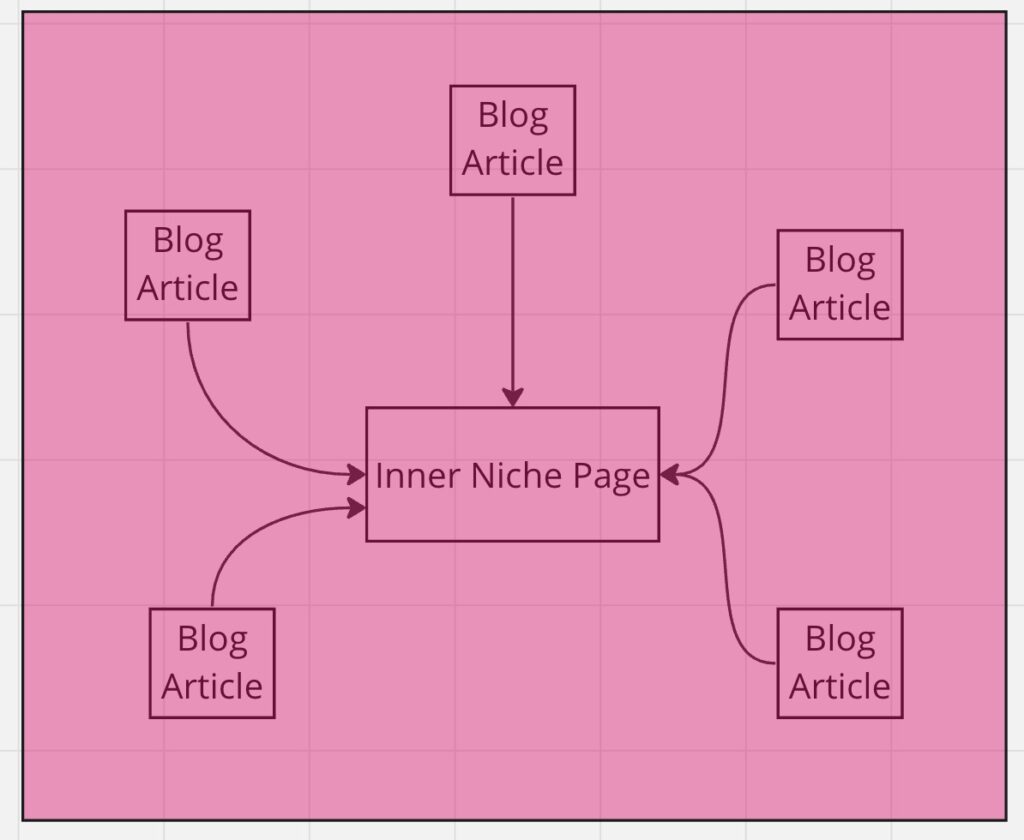
Line of business application keywords
Other areas of niche-specific SEO that your target audience is likely to search for include support or problems related to line of business applications (LOBAs). Take, for example, an account or financial support-related business. They will all use similar apps, such as Quickbooks, Sage or Xero. All of these applications have problems, error codes and support-related queries. A blog post or multiple blog posts covering the aid of a standard app across your existing customer base will help you gain topical authority in a niche-related keyword.
You can even take this a step further and think about the integrations, APIs and other related functions a business quite often may require support around a line of business application. Many modern managed service providers base their entire business on the help of a LOBA and related industry.
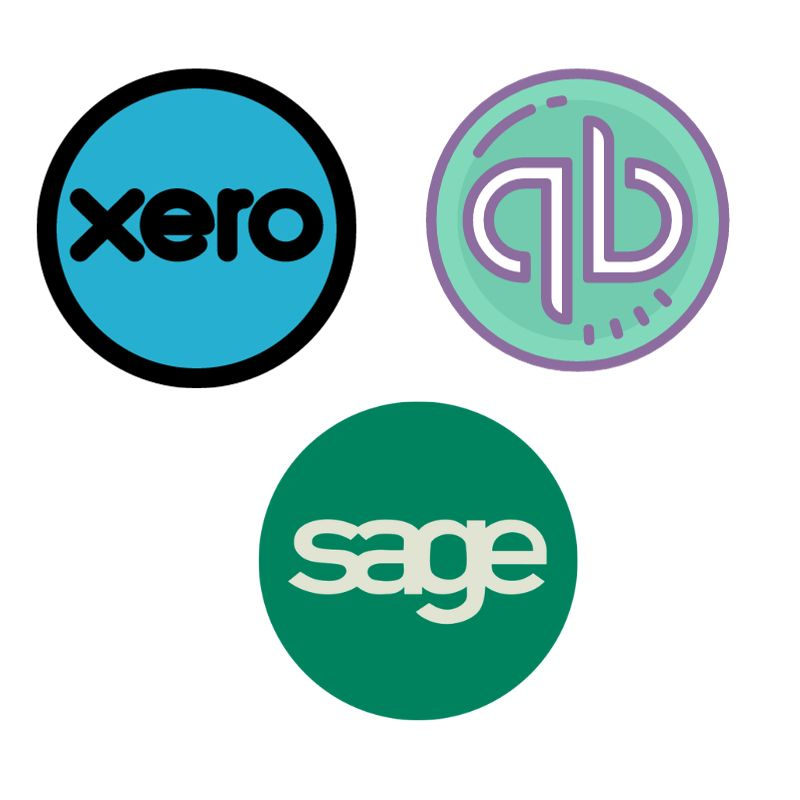
Casting my mind back to my days as a first-line support technician, I recall a specific app that integrated payroll software with a credit card for authorisation. It was specialised and standard for the software to require support if a PC was swapped out. Almost a niche within a niche that can identify IT support-related problems associated with a niche-specific LOBA will have virtually no competition regarding ranking content in the search engines or YouTube.
The Search Intent of MSP Keywords
Now, it’s essential to understand that there’s a stark difference between business-related keywords and residential ones. Many of you will agree that keyword research can sometimes feel overwhelming. While SEO tools like Google Keyword Planner, SEMrush, and Ahrefs are invaluable at finding relevant keywords, I always start with Google Search Console.
But here’s the kicker, and it’s something not all MSP SEO consultants will tell you: it’s not just about the keyword; it’s about the intent behind it.
While many prioritize monthly search volume in keyword research, there’s more to the story. For instance, the keyword “IT support” in your local area might have a high volume, but its intent might not be as valuable as other more specific keywords further down the buying funnel.
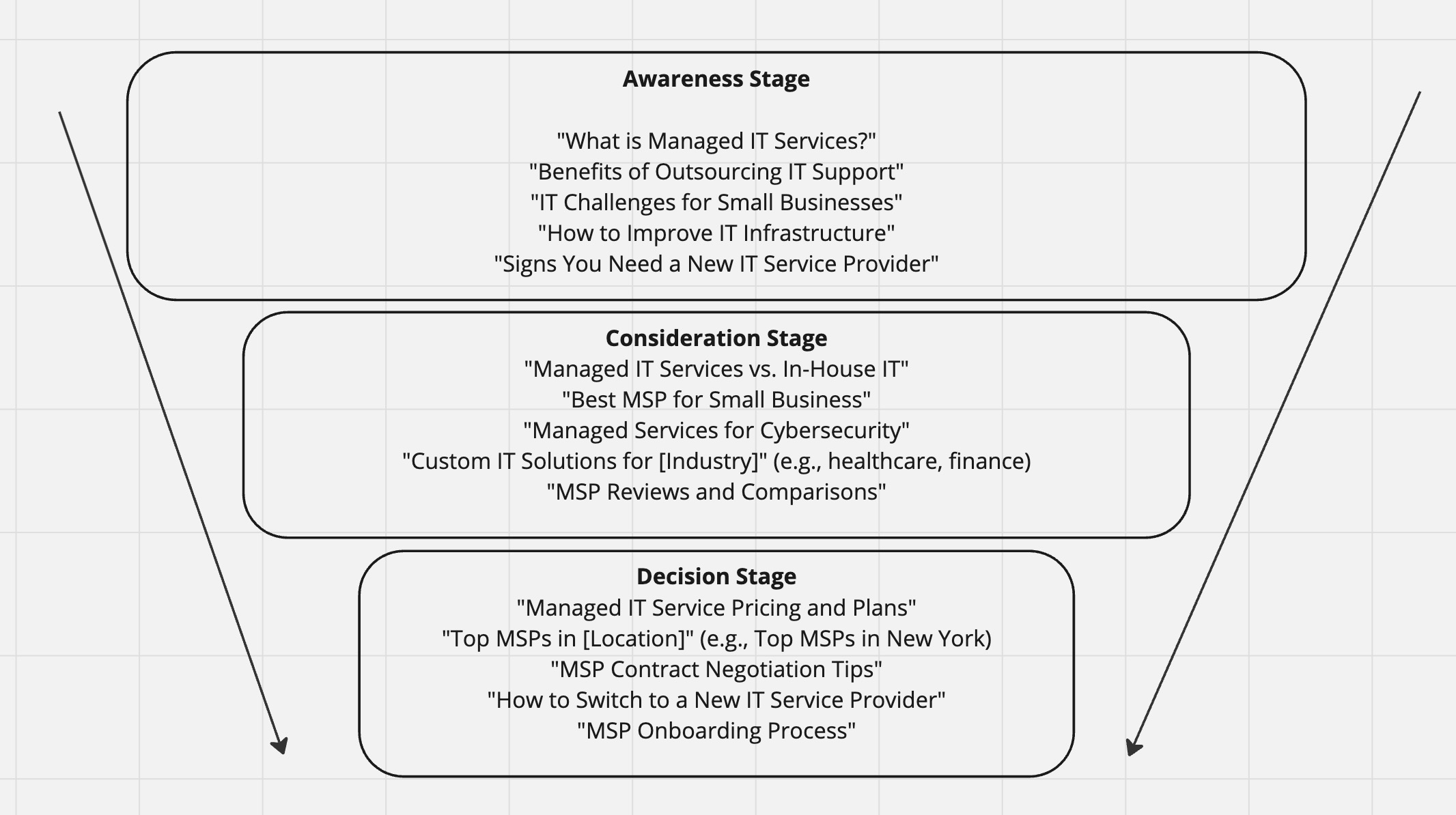
The search intent varies depending on the customer’s stage in their buying journey. They might be casually browsing local IT support firms or hunting for a specific IT provider that specializes in a particular industry. We’ve had tremendous success catapulting our IT Rockstars members to Google’s top ranks for niche terms. Instead of generic keywords, consider focusing on industry-specific IT support terms.
Researching buyer intent is crucial. For instance, someone seeking “IT support” is likely at the early stages, unsure which provider to choose. However, when you dive deeper into the buying journey, the Google Search Console becomes your best friend—formerly known as Webmaster Tools, this treasure trove, especially if you’ve had it installed on your site it for at least a year. It offers insights into the queries your MSP website ranks for. Some of these golden keywords are so unique that you won’t find them on typical tools like SEMrush or Google Keyword Planner.
Here’s a story to illustrate: I recently collaborated with an MSP who also did hardware recycling (yes, that’s still a thing). When we delved into Google Search Console, we found they ranked for several terms related to computer recycling, with some hidden gems they were ranking for on page two of the search. With a bit of attention and on site SEO, page ranking for competitive terms they’d never even thought about was within reach. Many MSPs chase more obvious keywords, but those focusing on buyer intent and taking time to research their existing search console data often discover untapped potential.
Targeting with free keyword research tools
ChatGPT
Part of your SEO strategy should include a content schedule or diary on what blog posts should be published to help build topical authority. ChatGPT is the perfect tool for creativity and finding semantically relevant topics related to your primary and secondary keywords.
Here are two ChatGPT prompts you can use in your MSP marketing efforts to get started:
ChatGPT MSP keyword prompt 1

This prompt will allow you to determine what’s most relevant to your existing customer base. Take an extract of the most common support queries in your helpdesk software and feed them into ChatGPT. The results will give you insights into content that can be developed for organic traffic that might not show in standard keyword research tools.
ChatGPT MSP keyword prompt 2

This prompt will give you insight into what’s semantically relevant to your main keywords. These relevant topics form supporting blog articles at the tertiary level of your MSP website.
Semrush
Finding the right keywords and discovering where the competition is getting backlinks can help you rank higher in the search results. Both Semrush and Ahrefs allow for managed service provider competitor analysis.
I’ve access to Semrush and an affiliate link to cover this tool 😃, but Ahrefs is just as good at what it does.
Within Semrush, here’s what to focus on:
Magic Keyword Tool
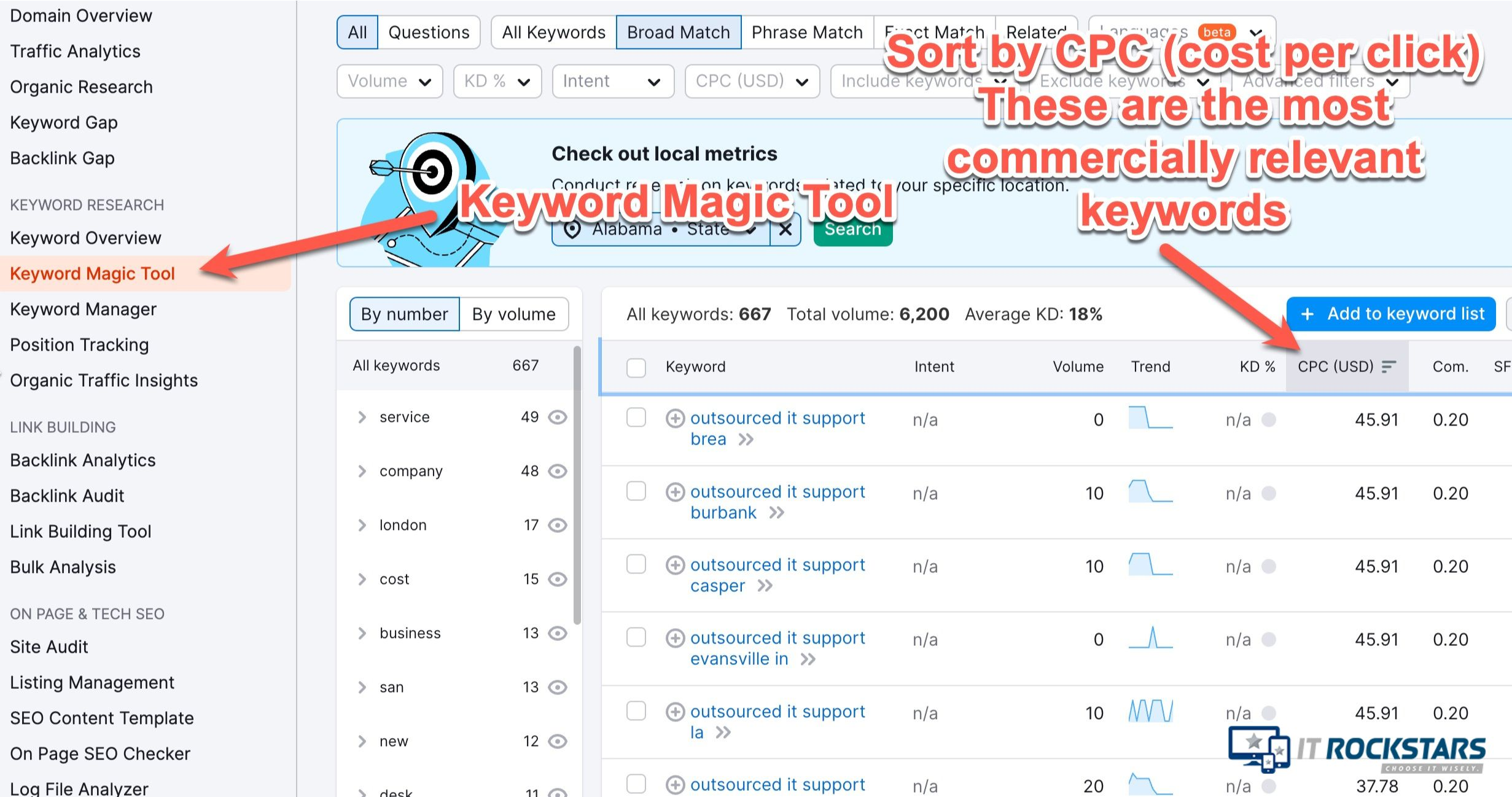
The magic keyword tool will show you related keywords associated with your primary and secondary keywords. If you sort the report by the CPC (cost per click), you’ll get a list of keywords that advertising dollars go after on Google ads. If you look closely at this, you’ll find some high CPC keywords with low competition, which you can easily rank for with little effort.
Google’s Search Engine Results
Google reveals itself with many keywords every time you visit the search engine. Type a general keyword in, and there are two places to look within the page – first, there’s the suggested search:
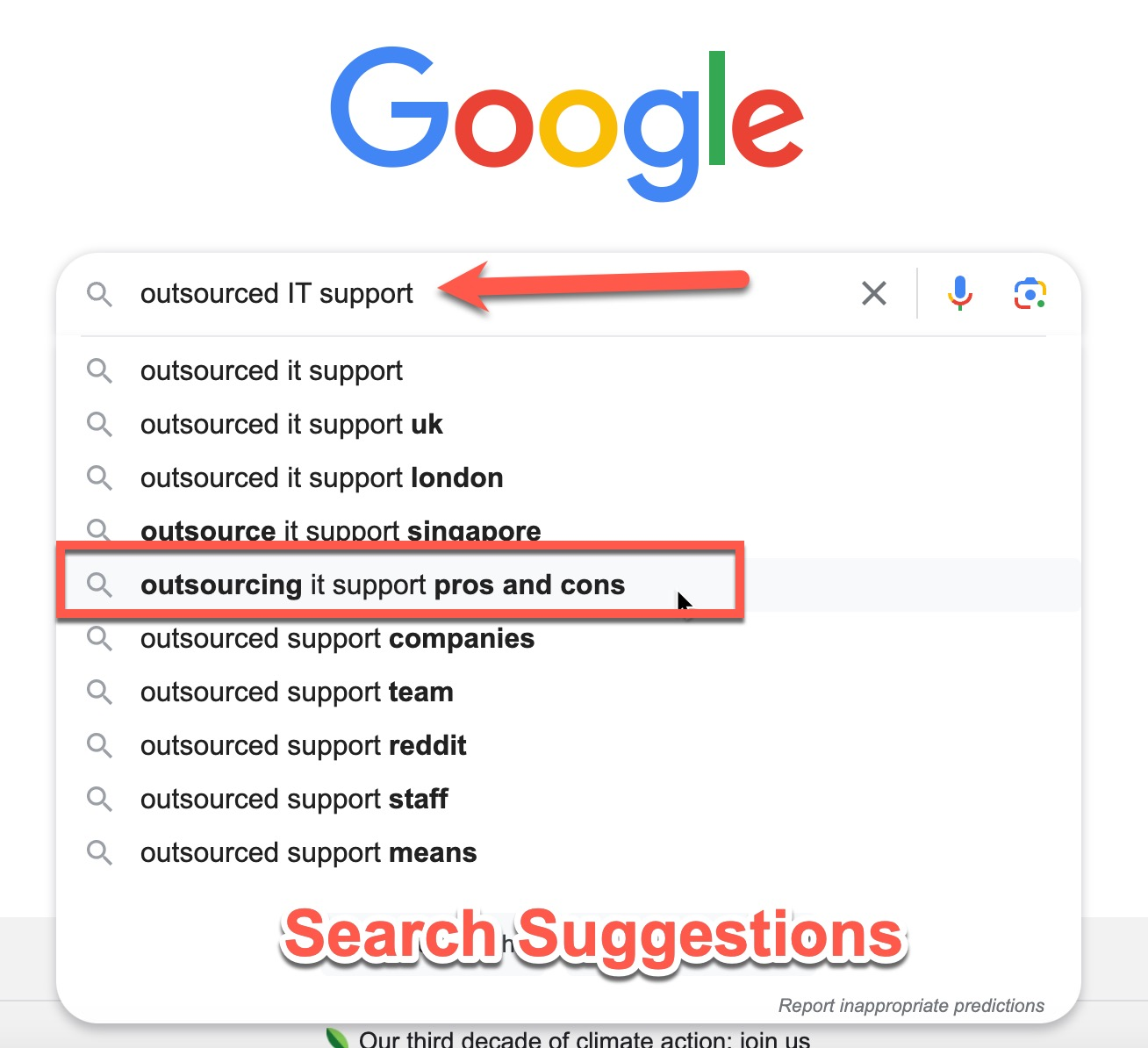
Taking this a step further, you can use a tool like Neil Patel’s Answer The Public & Ubersuggest, which will give you an insight into both the suggested search Google reveals and the other section of the search results within Google: “People also ask”.
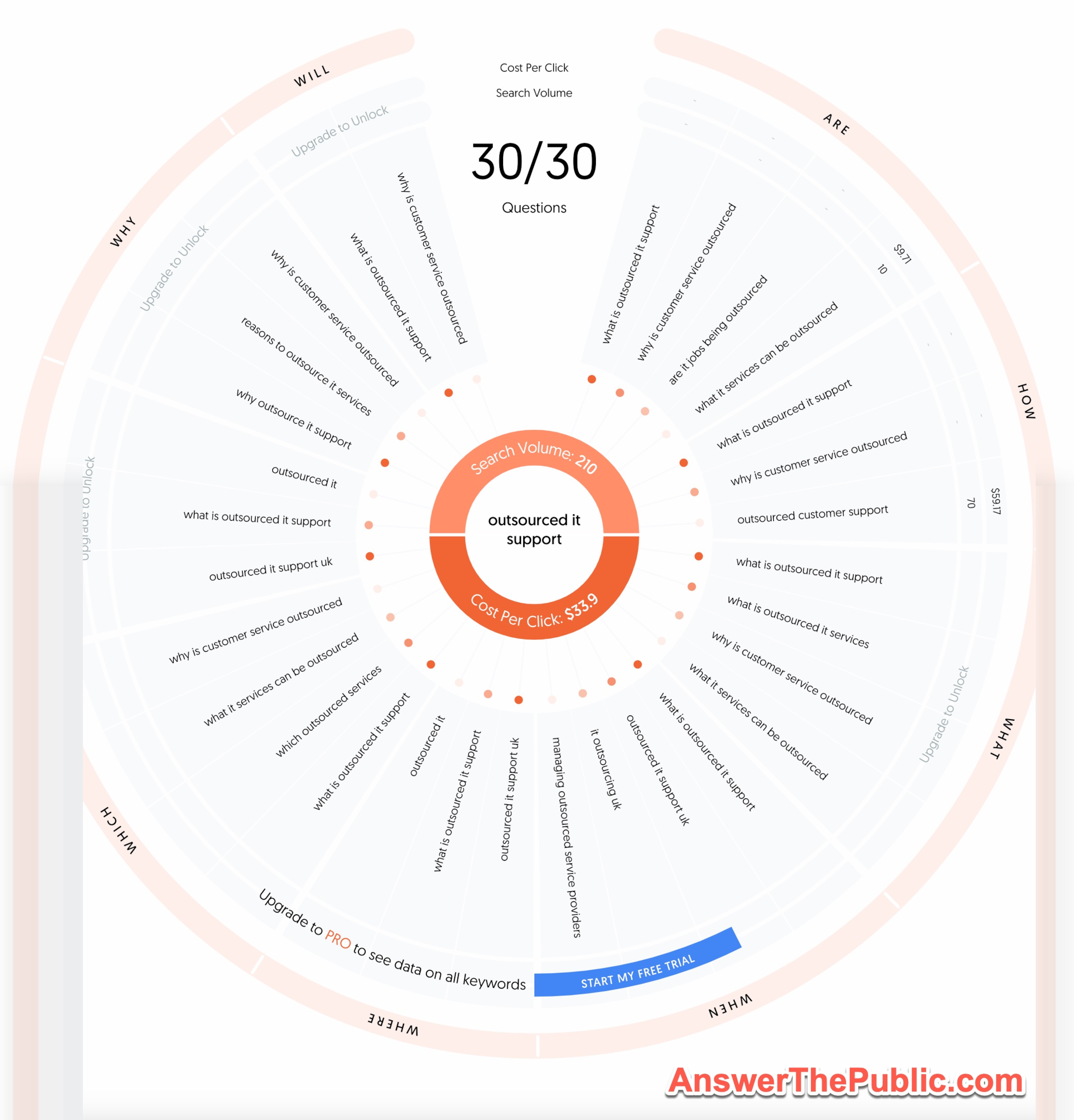
Google Keyword Planner
Finally, we come to a tool hidden within the Google Ads platform that allows those planning an ad spend with Google to research what potential keywords they should choose and associated costs and search volume.
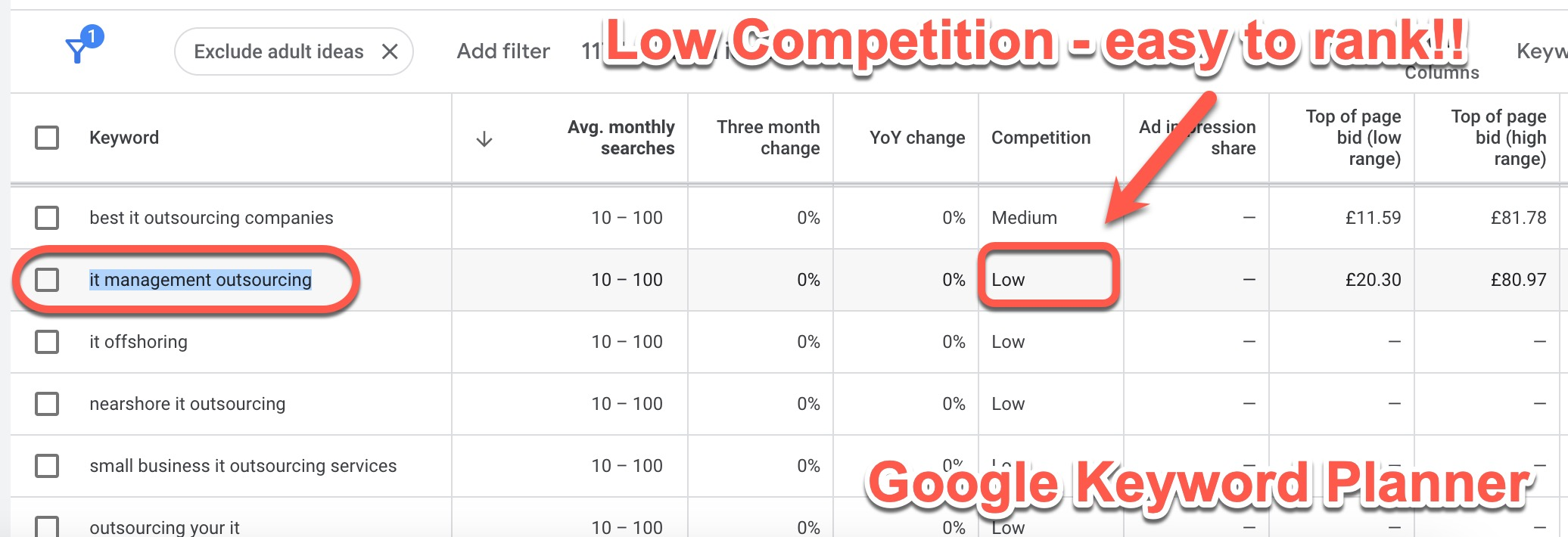
The example above shows that “IT management outsourcing” has around 10-100 searches per month. It probably exceeds 100, and the keyword has low competition – something you could rank for if you take the required action.
What many SEO experts will tell you about all the tools covered here is that search volume should be taken with a grain of salt as they are usually higher than reported. This is down to the fact that there are many long-tail keywords and similar variations of a keyword entered into the search. The other factor is that your website probably only needs to generate a small number of qualified leads every month to make back any investment you put towards your SEO efforts.
Last words: Actions to Take
It’s clear that the right approach can significantly impact your online presence and IT business growth. To put these insights into action, here are some key steps you can take:
Identify Your Niche: Start by clearly defining your niche market. Understand the specific needs and pain points of your target audience.
Research with Intent: Use tools like ChatGPT, Semrush, and Google Keyword Planner to uncover niche-specific keywords. Remember, it’s not just about the volume; it’s about the relevance and intent behind each search.
Optimize Your MSP Website: Tailor your website and blog content to address the specific needs of your niche. Use the primary, secondary, and tertiary keyword strategy to build topical authority.
If you are starting your SEO journey or have been burnt in the past, focus on the niches and intent of the search terms you want to rank for. You’ll be surprised just how far it will take you – this article proves how a niche within a niche (search engine optimization for MSPs) works as you’ve read this far, and I’ve probably stoked your interest to some degree.